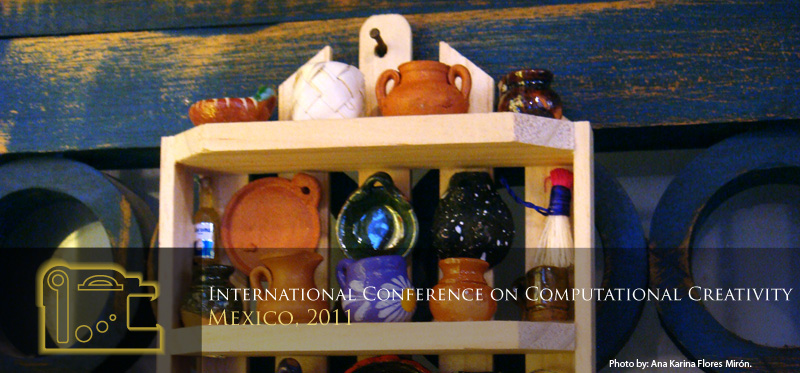 |
 |
 |
 |
 |
 |
 |
 |
2nd International Conference on Computational Creativity, 2011
Call for Papers
Original contributions are solicited in all areas related to Computational Creativity, including but not limited to:
- Computational paradigms for understanding creativity, including heuristic search, analogical and meta-level reasoning, and re-representation;
- Metrics, frameworks and formalizations for the evaluation of creativity in computational systems (note: quasi-formal approaches that, for example, argue for recognition without definition or that define the absence of creativity may have interesting implications for computational creativity);
- Perspectives on computational creativity, including philosophy, models of cognition and human behavior, and intelligent systems;
- Development and assessment of computational creativity-support tools;
- Creativity-oriented computing in learning, teaching, and other aspects of education;
- Innovation, improvisation and related pursuits investigating the production of novel experiences and artifacts within a computational framework;
- Computational accounts of factors that enhance creativity, including emotion, surprise (unexpectedness), conflict, diversity, motivation, knowledge, intuition, reward structures, and technologies (e.g. modeling, simulation, human-in-the-loop, human/machine collaboration, etc.);
- Computational treatment of social aspects of creativity, including the relationship between individual and social creativity, diffusion of ideas, collaboration and creativity, formation of creative teams, and creativity in social settings (e.g. modeling, simulation, human-in-the-loop, human/machine collaboration, etc.);
- Specific applications (with a computational component) to music, language, narrative, poetry, the arts, architecture, entertainment, mathematical and and scientific discovery, programming and/or design;
- Detailed system descriptions of creative systems, including engineering difficulties faced, example sessions and artefacts produced, and applications of the system;
- Domain-specific vs. generalized creat - does the domain of study affect (the perception of) creativity? Are there general, (computational) creative principles that can be applied across domains?
PAPERS
We invite papers that make a scientific contribution to the field of computational creativity and report work that involves computation, e.g., fully autonomous systems, modeling, support for human creativity, simulation, human/machine collaboration, etc.).
We welcome studies of human creativity that in some way propose a computational model for that creativity.
When papers report on creative computer systems, we particularly encourage them to discuss systems having general or at least multiple sorts of results, to detail the methods used to design and develop the system, or to include useful related theoretical discussion.
We invite papers that go beyond simply documenting interesting systems to describe advances in cognitive science, assessment methods, design methods, or other research areas.
SUBMITTING PAPERS
Two categories of submissions are welcome: full papers and short papers.
Full papers must be no longer than 6 pages in length, and are expected to address foundational issues and research proposals and reports, or to describe in detail current research on creative systems development and modelling.
Short papers must be no longer than 3 pages and are expected to describe ongoing work.
All submissions will be reviewed in terms of quality, impact and relevance to the area of computational creativity.
To be considered, papers must be submitted as a PDF document formatted according to ICCC style (which is similar to AAAI and IJCAI formats).
Contributions will be subject to anonymous, blind peer review: reviewers will not be aware of the identities of the authors. This requires that authors exercise some care not to identify themselves in their contributions. Authors will receive feedback in the form of reviewers' comments.
All submissions will be made by electronic means using the EasyChair system.
The ICCC Author Kit (with templates and detailed instructions) and a link to the ICCC11 area of EasyChair are both available on the conference site's submission page.
DEMOS/ARTS SHOW AND TELL
We invite proposals for demonstrations of computational systems exhibiting behavior that would be deemed creative in humans and for the exhibition of artifacts created using computational means, either primarily or as support for a human creator.









